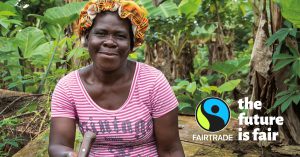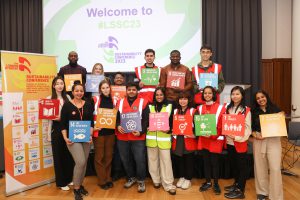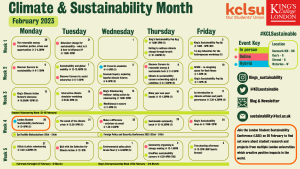This guest blog post was written by George Hill, Library Assistant (Frontline Services) in Libraries and Collections at King’s.
 Every year the Fairtrade Foundation organises Fairtrade Fortnight. This celebration of all things fairtrade seeks to raise awareness around key issues like workers’ rights, sustainability, and climate action; alongside encouraging people to swap Fairtrade-certified products. It also offers an opportunity for introspection and reflection, offering a chance for sustainability advocates and organisers to reflect on the successes of the fairtrade movement whilst looking at where we can improve.
Every year the Fairtrade Foundation organises Fairtrade Fortnight. This celebration of all things fairtrade seeks to raise awareness around key issues like workers’ rights, sustainability, and climate action; alongside encouraging people to swap Fairtrade-certified products. It also offers an opportunity for introspection and reflection, offering a chance for sustainability advocates and organisers to reflect on the successes of the fairtrade movement whilst looking at where we can improve.
As part of this year’s Fairtrade Fortnight, King’s hosted a talk on Ethical and Fairtrade Consumption. Our two excellent speakers included Ruth Strange from Ethical Consumer – a multi-stakeholder co-operative consumer magazine – alongside Lisa Connellan from King’s Food. Each had the opportunity to share what their respective organisations have been doing to encourage more sustainable and equitable consumer behaviour, as well as discuss what the next steps for achieving a more sustainable future might be.
Ruth kicked off her talk with a quick explanation of the excellent work done by Ethical Consumer in the field of sustainability advocacy and consumer choice. She explained how the magazine, founded in 1989, aims to offer consumers a clear and accessible way to compare how equitable and sustainable different brands and products are. The magazine scores particular brands and products out of 20 for sustainability and then ranks them against alternatives. It also offers a range of interesting ‘deep dives’ into everything from palm oil to tea to travel booking companies – helping to raise consciousness around issues like worker exploitation and climate degradation.
The main body of Ruth’s talk was an explanation and evaluation of the work of Fairtrade International and the Fairtrade Foundation. She framed this talk around five key issues: the meaning of Fairtrade, the importance of Fairtrade, its limits, and the accessibility (or lack thereof) of Fairtrade products. We learned how Fairtrade certification helps give consumers the information they need to help foster better consumer habits, in turn helping small producers – especially those producing products that were traditionally colonial cash crops for the west – to gain inroads into markets traditionally dominated by extractive and exploitative business interests. We also learned how Fairtrade promotes producers who guarantee fair wages for their employees; promotes worker democracy through collective bargaining agreements and trade union rights; and protects their workforce through minimum health and safety standards.
As well as emphasising the importance of Fairtrade and the good work that the Fairtrade Foundation does, Ruth also addressed some of the limits of Fairtrade certification. This includes the ongoing fairtrade certification of products produced by companies implicated in human rights abuses, as well as the problem of the affordability of some Fairtrade products. She nonetheless identified fairtrade as the ‘best option for continuous improvement’ – reminding the audience that it is best to not let ‘the perfect be the enemy of the good’.
Next up was King’s Food Manager Lisa Connellan, who offered an insight into some of the progress King’s Food have been making in implementing sustainable practices, whilst building on their varied and delicious range of food.
First on the menu was a look into King’s increasingly varied range of plant-based food. We learned that 65% of all food offered at King’s 20 outlets is now plant-based, with vegetarian and vegan options now served as default. This includes all kinds of different items, including ice cream, pies, croissants, and vegan sausage rolls (which I highly recommend). The university also no longer serves beef, rarely serves lamb and only sources from farmers committed to high levels of environmental stewardship. The progress King’s has made in reducing the amount of meat and dairy served means the university is now listed as one of PETAs top 10 vegan unis. It has also been awarded 3/3 stars by the Sustainable Restaurant Association.
Lisa also outlined King’s ongoing commitment to ethically sourced ingredients and to using fairtrade certified products throughout the supply chain. This includes King’s continued promotion of Fairtrade products, experiments with ‘reverse menu engineering’, and diligence in looking for the best and most ethical suppliers.
Looking to the future, Lisa said that King’s has a lot of plans for the coming months and years to help build on the university’s commitment to sustainable and ethical practices. This includes working towards getting a three-star Fairtrade University Award, looking into carbon taxing on products, further collaborating with students and researchers specialising in sustainability, and working with King’s Fairtrade and Sustainable Food Steering Group on how to implement policy.
Special thanks to all the wonderful organisers who made the talk possible, and to the King’s Sustainability team for all the work they do in promoting this important topic.
Relevant links:
- Event recording: https://media.kcl.ac.uk/media/Ethical+and+Fairtrade+consumption/1_4vb28e3j
- More about Fairtrade Fortnight 2023: https://www.fairtrade.org.uk/get-involved/Current-campaigns/Fairtrade-Fortnight-/
- Fairtrade at King’s: https://www.kcl.ac.uk/climate-sustainability/operations-policies/fairtrade
- Ethical Consumer: https://www.ethicalconsumer.org/



